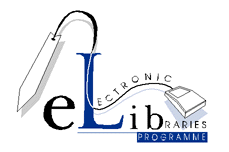
Birmingham University Integrated Development and Electronic Resource
- Project web site
- http://builder.bham.ac.uk/
- Programme area
- Hybrid Libraries
- Contact details
- Michele Shoebridge
Project Director
Information Services,
Main Library,
The University of Birmingham,
Edgbaston, Birmingham B15 2TT
Tel: +44 (0) 121 414 5808
Fax: +44 (0) 121 471 4691
Email: m.i.shoebridge@bham.ac.uk
Ruth Jenkins
Project Co-ordinator
Information Services,
Main Library,
The University of Birmingham, Edgbaston,
Birmingham B15 2TT
Tel: +44 (0) 121 414 3054
Fax: +44 (0) 121 471 4691
Email: r.jenkins@bham.ac.uk
Project description
as of April 16th 1998
Introduction
To develop a working model of the hybrid library within both a teaching and research context, seamlessly integrating access to a wide range of printed and electronic information sources, local and remote, using a Web-based interface, and in a way which will be universally applicable. The model will focus on a series of six inter-related modules (user registration and induction; ordering and delivery of materials; metadata index for printed and electronic sources; teaching and learning; publication and digitisation; access gateways) which will be developed for and applied across six subject areas (history and archaeology, business, education, physics, sports science, medicine).
Description
Positioned as we are between the locational and virtual campus, teaching and independent learning, scarce resources and increased demand, print-based sources and digital technology, the concept of a hybrid library is inevitably complex. It is a point on the continuum to the virtual library, with the balance between the traditional and electronic aspects of provision set to change over time. The BUILDER project will seek to develop and encourage end-user resource discovery, in a multiplicity of formats, from a range of local and remote sources alongside an investigation into the better organisation and interaction of traditional library functions in the areas of collection building and document delivery. The project will also investigate the potential of the hybrid library to improve support for the students' learning experience; increase end-user awareness of, and access to, information resources; provide better application of resources and utilisation of information technology and support information professionals in their changing roles in the hybrid environment.
Key deliverables
- a set of six prototype modules and interfaces (user registration and induction; ordering and delivery of materials; metadata; teaching and learning; publication and digitisation; access gateways).
- testing of modules against specified criteria across the six subject areas (each module will be evaluated by between two or three subject areas) and the provision of end-user training to the module teams.
- detailed evaluation and dissemination of outcomes, using electronic (Web-based) bulletins, seminars and demonstrations.
- a programme of workshops and seminars for academic staff and information professionals focused on both subject and non-subject specific outcomes; the exploration of management and service issues of implementing a Hybrid Library model including costs benefits and problem analysis and an evaluation of the end-user training and human resource issues.
- further implementation of the prototype modules across a broader sample client base, including different subject areas (maximum 2) and different partner sites (maximum 2, potentially located within the West Midlands region).
- consideration of a wide range of hybrid library issues:
Partners and their roles
- University of Birmingham As the lead partner, Birmingham will be responsible for all aspects of the management of the project.
Primary partners
The portability of the project results is seen as essential for read-across in the national context. Four libraries (three higher education and one public) will act as primary partner test beds:
- University of Wolverhampton
- The Orchard Centre, Selly Oak
- University of Oxford
- Birmingham Library Services
Secondary partners
An essential component of the project will be to integrate products, services and insights from a range of non-library external sources as secondary partners, including representatives of professional associations, library systems suppliers, online bookshops, and large and small publishers. A wide range of secondary partners is associated with the project.
Background
Many of the recommendations of the Follett Report related to ways in which the use of information technology in the electronic library can help to alleviate some of the problems of university libraries today. The Joint Information Systems Committee (JISC) established the Electronic Libraries Programme (eLib) as a direct response to the Follett Report. The programme has a budget of about £15 million over 3 years, and its objectives include the use of IT to improve delivery of information through increased use of electronic library services, to allow academic libraries to cope better with growth, to explore different models of intellectual property management and to encourage new methods of scholarly publishing.
This is one of the successful projects in the Hybrid Libraries Programme Area.

